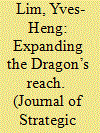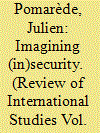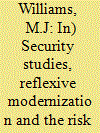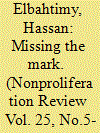| Srl | Item |
| 1 |
ID:
151425


|
|
|
|
|
| Summary/Abstract |
Among the multiple dimensions of the tous azimuths modernisation of Chinese naval forces, the development of China’s anti-access capacity has recently elicited considerable interest. The important link between this capacity and an overarching vision of the use of force – i.e. a naval doctrine – has, however, often been left implicit. This article shows that the particular development of China’s naval anti-access forces – more precisely, forces with an impact on the naval balance – can be explained by a shift of China’s naval doctrine towards a distinctly pre-emptive posture, which, itself, stems from the set of constraints imposed by the framework of ‘local war under informationised conditions’.
|
|
|
|
|
|
|
|
|
|
|
|
|
|
|
|
| 2 |
ID:
178874


|
|
|
|
|
| Summary/Abstract |
How do scenarios of dangerous futures imagined in the framework of the post-9/11 counterterrorism shape security institutions? Critical Security Studies (CSS)'s dominant answer is that state apparatus are significantly transformed by the use of new technologies of prediction that are very prolific in imagining potential risks. The present article questions this technologically determinist thesis. Introducing the notion of weak field in the study of pre-emption, it argues that the political sociology of transnational fields of power can help us in historicise and assess more precisely the impact of imagination over power and control in the pre-emptive era. The article analyses NATO's reaction to 9/11 as a case study. It shows how the fabrication of potential terrorist threats by NATO's practitioners, that served to justify the pre-emptive use of the collective self-defence clause of the Washington Treaty (Article 5), evolved into an ambiguous support for NATO's military policing of the Mediterranean basin and into its involvement in migration control.
|
|
|
|
|
|
|
|
|
|
|
|
|
|
|
|
| 3 |
ID:
080901


|
|
|
|
|
| Publication |
2008.
|
| Summary/Abstract |
At the dawn of the twenty-first century, the overwhelming challenge that confronts Western policy-makers is the management of diverse, amorphous and qualitative security risks, rather than the fixed, quantifiable threats of yesteryear. As such, policy-makers have had to move from a reactive to a more proactive mindset, which ultimately challenges established international institutions and norms of action. This change has been seen at both the domestic and international levels and gained prominence with sociologist Ulrich Beck's Risk Society thesis in the early 1990s. The risk paradigm calls into question many commonly used concepts in international relations (IR), such as established forms of cooperation and the utility of force. Because such a burgeoning security studies research agenda, inspired by Beck's writing, has begun to develop, I examine this new literature and the challenges that the Risk Society paradigm poses to IR as an academic study. I also raise the need to reconsider thinking surrounding the use of force, security cooperation and international law in light of the security risks and challenges that confront the West today.
|
|
|
|
|
|
|
|
|
|
|
|
|
|
|
|
| 4 |
ID:
167790


|
|
|
|
|
| Summary/Abstract |
Did nuclear considerations play an important role in the outbreak of the 1967 Arab-Israeli War? This research article seeks to answer this question by examining Egyptian decisions and conduct during the crisis preceding the war. The article argues that, despite long-standing Egyptian concerns over Israeli nuclear ambitions, the issue played only a marginal role in Egypt’s path to war. Egypt’s slide into war was a result of miscalculation rather than a deliberate plan to destroy Dimona. During the pre-war crisis, the nuclear dimension played only a minor role in Egyptian military planning. While a contingency plan to target Dimona was studied, it was never implemented. The article predominantly draws on Arabic-language sources, including first-hand accounts of Egyptian decision making during the pre-war crisis.
|
|
|
|
|
|
|
|
|
|
|
|
|
|
|
|
| 5 |
ID:
153903


|
|
|
|
|
| Summary/Abstract |
Leading US military figures have discussed the use of pre-emptive cyberattack to disable or disrupt enemy nuclear missiles. While Russia does not appear to have such a highly developed concept, it now sees US plans to disrupt the command and control of its nuclear weapons as the main threat it faces at the strategic level of warfare. Cyberweapons and strategies have brought us to a situation of aggravated nuclear instability that needs to be more explicitly and openly addressed in the diplomacy of leading powers, both in private and in public. This article draws attention to a convergence between Russian interest in pre-emptive attack and reasonable views of Western strategists and scholars that the character of cyberspace favors offense and may encourage pre-emptive action. Since bilateral arms-control regimes for cyberspace are unlikely given the difficulty of verification and escalating US-Russian tension, states should commit to restraint regarding cyberattacks on nuclear military assets.
|
|
|
|
|
|
|
|
|
|
|
|
|
|
|
|